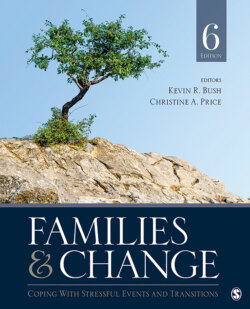Читать книгу Families & Change - Группа авторов - Страница 61
На сайте Литреса книга снята с продажи.
Chapter 4 Parental Stress Viewed Through the Lens of Family Stress Theory
ОглавлениеGary W. Peterson
During the socialization process in many cultures most of us are strongly encouraged through multiple influences to value children and become parents as a fundamental experience in a person’s life. Females, in particular, are traditionally socialized to view motherhood as a primary source of life satisfaction and, more recently, men have been encouraged to identify with fatherhood more than in the past (Bigner, 2010; Holden, 2015; Marsiglio & Roy, 2013). Positive cultural images of parenthood, partly based in pronatalist and religious influences, are key sources of the pervasive idea that raising children is almost always a life-fulfilling experience.
Pronatalism is a complex set of beliefs and actions that promote childbearing and parenthood as highly desirable outcomes. These beliefs and actions are powerfully encouraged by social justifications, beliefs about personal welfare, religious views, biological reasons, and to ensure the existence of the human species (Green, 2017). Pronatalism can be promoted through public policies aimed at creating financial, legal, and social incentives such as tax incentives or government programs that reward having and caring for children. Those who support pronatalist social policies often seek ways to limit the use of birth control through abortion and contraception (Green, 2017).
An example of a conservative religious group that is also pronatalist is the Quiverfull fundamentalist sect located in the United States and to some extent internationally. The Quiverfulls are an evangelical group of Christians who promote procreation and parenthood by believing strongly that children are blessings given by God and reject all forms of contraception, including natural family planning, sterilization, and abortion (Blumberg, 2015). This sect defines any form of birth control by married couples to be wrongful disobedience to the word of God, which is captured in the Biblical phrase “Be fruitful and multiply” (Kaufmann, 2011). Happiness and reduced stress are supposed to result from parenthood, especially for Quiverfull women, when they reject any form of birth control and accept their biblically mandated roles of motherhood. Husbands are ordained by God to be leaders of patriarchal family systems and are strongly encouraged to be involved parents as strong authority figures. Quiverfulls further argue that parental stress is divinely controlled and lessened because God is all-knowing and will not give each parent or adult more children than that which they can reasonably cope (Blumberg, 2015).
Other positive and even romanticized views of parenting have their basis in secular beliefs that children almost always make parents’ lives complete and more meaningful. Raising children is seen as a source of fun, novelty, stimulation and a means of solidifying ties among parents, grandparents, kin, and parental surrogates (Cloud, 2011; Eibach & Mock, 2011). Parenthood provides a socially defined marker of mature status, a sense of permanence, and feelings of personal efficacy (Bigner, 2010; Holden, 2015). Recent evolutionary views also reinforce pronatalist perspectives by proposing that, due to natural selection processes, our genetic heritage provides a significant biological propensity for adults to assume parental roles. Although these natural tendencies to become parents can be changed, considerable effort is needed to consciously alter such predispositions (Buss, 2005). This means that pronatalist and unrealistically positive views of parenting often are dominant, while more objective assessments of the challenges and stresses involved are neglected. The purpose of this chapter is to apply concepts from family stress theory to provide a more realistic and balanced conception of parenting, which includes the pervasive and variable presence of both normative and nonnormative forms of parental stress.
